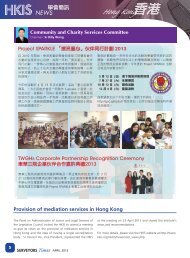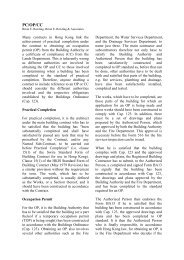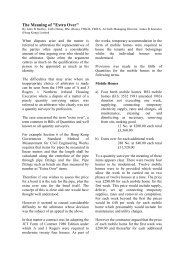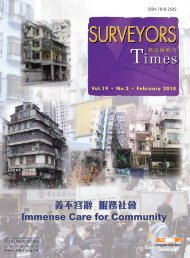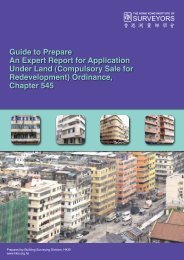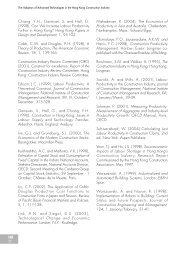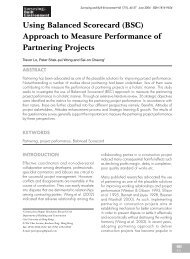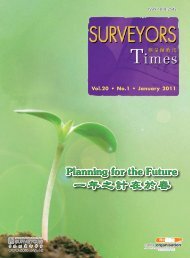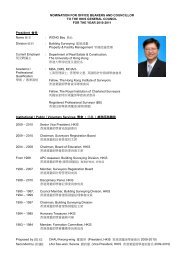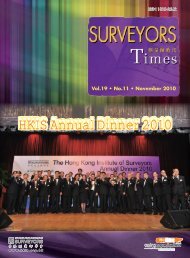Surveying & Built Environment Vol. 22 Issue 1 (December 2012)
Surveying & Built Environment Vol. 22 Issue 1 (December 2012)
Surveying & Built Environment Vol. 22 Issue 1 (December 2012)
Create successful ePaper yourself
Turn your PDF publications into a flip-book with our unique Google optimized e-Paper software.
SBE<br />
46<br />
Good Property Valuation in Emerging Real Estate Markets? Evidence from Ghana<br />
usually by private valuers. The method<br />
works by capitalising the income from<br />
the farm at a particular yield over a<br />
period of time. So, in a palm plantation,<br />
for example, the annual income from<br />
the palm fruits and the annual market<br />
value of the trees would be estimated<br />
by drawing on market information<br />
collected from the Ministry of Food<br />
and Agriculture or directly from food<br />
markets. With a suitable yield, the total<br />
annual income from the farm would be<br />
capitalised for the term of the farm to<br />
arrive at its market value.<br />
Finally, the Market Approach – not<br />
Cost Approach - is usually used in<br />
the valuation of properties in newly<br />
developed estates, such as those in<br />
Hydraform Estates, Regimmanuel<br />
Estates, Coastal Estates and Ayensu<br />
River Estates in the Accra-Tema area.<br />
Houses from these companies may sell<br />
between $30,000 and over $300,000<br />
depending, inter alia, on location,<br />
finishes, number of rooms, and size (see<br />
Karley, 2009 and Grant, 2009 for more<br />
detailed discussion). In this scenario,<br />
valuers obtain relevant information<br />
from the estate developers about market<br />
values of the units which they have<br />
developed. A related scenario is when<br />
valuers are called upon to assess the<br />
value of properties which are sold by<br />
quasi state departments such as the<br />
Tema Development Corporation (TDC)<br />
and the Social Security and National<br />
Insurance Trust (SSNIT). As with estate<br />
housing, it is fairly straightforward<br />
to ascertain the market value of such<br />
properties by consulting with the real<br />
estate departments of TDC and SSNIT.<br />
If there is so much information about<br />
these properties, why is the use of<br />
the Cost Approach so pervasive in<br />
Ghana? Most landed properties in<br />
Ghana do not have the features of<br />
those just described. Most are built<br />
incrementally by individuals, rather<br />
than by estate developers (Tipple et<br />
al., 1997; Tipple and Korboe, 1998;<br />
Tipple, 1999; Tipple and Speak, 2009).<br />
According to the Bank of Ghana (2007),<br />
members of the Ghana Real Estate<br />
Developers Association (GREDA)<br />
have constructed an estimated 10,954<br />
houses, constituting less than 1 per cent<br />
of the housing stock in Ghana. Thus,<br />
it is only in a few cases that the flow of<br />
market information is unimpeded.<br />
In the majority of cases, there is severe<br />
information asymmetry. Limited<br />
information is characteristic of land<br />
markets everywhere, of course. It arises<br />
inter alia because every parcel of land is<br />
different by reason of location and most<br />
property transactions do not neatly fit<br />
any one property sub-market (Johnson<br />
et al., 2000, pp.1-11). However, apart<br />
from these commonplace features of<br />
land and property markets, there are<br />
other factors that are peculiar to Ghana.<br />
One is the prevalence of cultural norms.<br />
Transactions in land and property<br />
are often shrouded in secrecy. Some<br />
people equate the sale of houses with<br />
being indebted, the rationale behind<br />
the forced sale of houses. Therefore,<br />
to avoid being labelled ‘financially<br />
bankrupt’, those who sell their houses<br />
do so ‘undercover’, leading to a<br />
situation where most land transactions<br />
are not formally recorded (Antwi and<br />
Adams, 2003). In a recent survey on<br />
how people buy or build houses in<br />
Ghana, Grant (2009, p.83) notes:<br />
..these are sensitive questions in<br />
any housing environment, and<br />
particularly so in Ghana because<br />
of cultural norms. Twenty-five<br />
percent of respondents …did not



